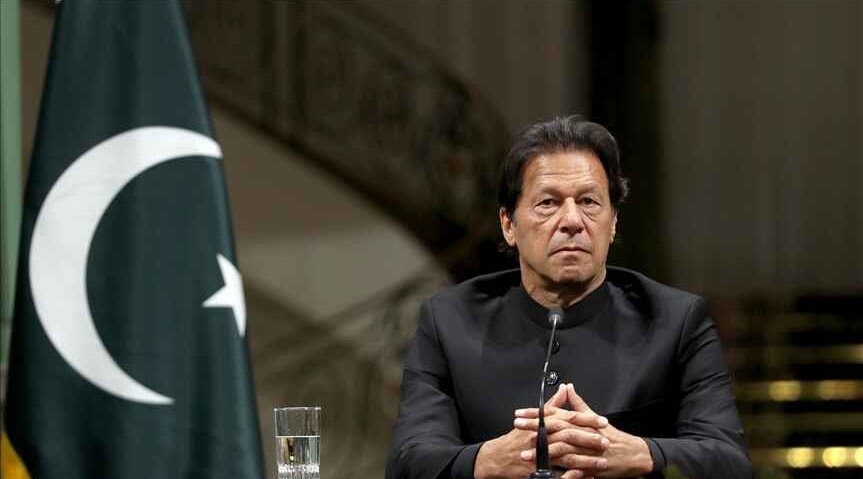Pakistan premier calls for global dialogue on Islamophobia
Imran Khan address to UN General Assembly touches on Taliban, Kashmir, coronavirus

Pakistan's Prime Minister Imran Khan on Friday called for global efforts to counter the rising tide of Islamophobia, mitigate the surging coronavirus threat and a resolution to the lingering dispute in Kashmir.
Addressing the 76th session of the UN General Assembly session in New York through video link, he also encouraged incentivizing the Taliban to get the group to honor commitments to the international community.
Khan asked the UN Secretary-General to convene a global dialogue on countering the "rise of Islamophobia" to save the world from another kind of terrorism in the name of the rising phenomenon.
He accused longtime rival India of toeing the "worst and most pervasive" form of Islamophobia by unleashing a reign of fear and violence against India’s 200 million-strong Muslim community.
"Mob lynching by cow vigilantes; frequent pogroms, such as the one in New Delhi last year; discriminatory citizenship laws to purge India of Muslims; and a campaign to destroy mosques across India and obliterate its Muslim heritage and history, are all part of this criminal enterprise, " he said.
Terming a "free and fair" plebiscite in disputed Jammu and Kashmir in accordance with UN Security Council resolutions to the long-running dispute the only way for "sustainable" peace in South Asia, Khan reiterated his country's desire for peace with India.
But he put the responsibility for the resumption of long-stalled peace talks between the two neighbors on India.
"The onus remains on India to create a conducive environment for meaningful and result-oriented engagement with Pakistan. And for that, it must do: One, reverse its unilateral and illegal measures instituted since Aug. 5, 2019; two, stop its oppression and human rights violations against the people of Kashmir; and three, halt and reverse the demographic changes in the occupied territory, " he said.
Warning of an existing potential threat of a nuclear conflict in South Asia, the premier urged the international community to prevent "another conflict" between Pakistan and India.
"India’s military build-up, development of advanced nuclear weapons, and acquisition of destabilizing conventional capabilities, can erode mutual deterrence between the two countries, " he said.
Looming humanitarian crisis in Afghanistan
As the Taliban struggles to put up a credible governance structure in Afghanistan, Khan warned that a "looming" humanitarian crisis may turn the war-torn country into a "safe haven” for terrorists again.
"There is a huge humanitarian crisis looming ahead. And this will have serious repercussions not just for the neighbors of Afghanistan but everywhere, " he said.
To avoid that, Khan opined, there is only one way to go: the world must "strengthen and stabilize" the current government, for the sake of the people of Afghanistan.
“A destabilized, chaotic Afghanistan will again become a safe haven for international terrorists -- the reason why the US came to Afghanistan in the first place," Khan cautioned, referring to the American invasion of Afghanistan to eliminate the al-Qaeda network, which it holds responsible for the deadly 9/11 terror attacks in New York and Washington.
"Now the whole international community should think what is the way ahead. There are two paths that we can take. If we neglect Afghanistan right now, according to the UN, half the people of Afghanistan are already vulnerable, and by next year almost 90% of the people in Afghanistan will go below the poverty line," he said.
If the world community incentivizes the Taliban and encourages them to honor their commitments to the international community, including not allowing their soil to be used against another country, "it will be a win-win situation for everyone," Khan argued.
Triple challenge
Khan said the world is facing the triple challenge of Covid-19, the accompanying economic crisis and threats posed by climate change, which has not only exposed the fragility of the international system but also underscored the "oneness of humanity.".
To address the triple crises, he called for a comprehensive strategy that should include vaccine equity and adequate financing for developing countries.
Drawing the world’s attention toward the "scourge" of illicit financial flows from developing countries, he urged the UN to take steps that are "meaningfully to address this deeply disturbing, and morally repugnant, situation."
"Naming and shaming the haven destinations and developing a comprehensive legal framework to halt and reverse the illicit financial flows are most critical actions to stop this grave economic injustice," he said.
He even drew a parallel between the East India Company, through which the British Empire strengthened its colonial rule over undivided India in the 17th century, and the current strategy by the West.
"What East India Company did to India, the crooked ruling elites are doing to developing world -- plundering the wealth and transferring to western capitals and offshore tax havens."
The UN Secretary General’s High-Level Panel on Financial Accountability, Transparency and Integrity (FACTI), he said, has calculated that a staggering $7 trillion in stolen assets are parked in the financial “haven” destinations.
